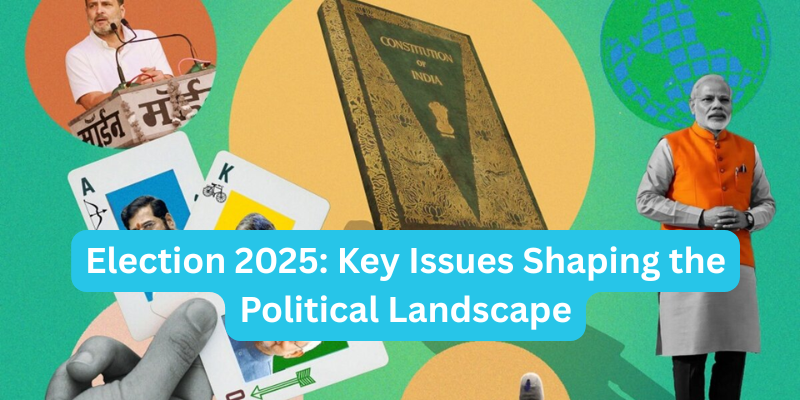The year 2025 is set to be one of the most transformative in recent political history. As voters prepare to head to the polls, the conversation isn’t just about who will lead—it’s about how that leadership will tackle a world that’s rapidly evolving. From economic reform to climate action, artificial intelligence to public healthcare, the political landscape is shifting under the weight of change, innovation, and growing public expectations.
This election isn’t merely a battle of personalities or parties; it’s a referendum on the future. In this deep dive, we explore the key issues that are shaping the narrative and influencing voter decisions in Election 2025.
1. Economic Recovery in a Post-Pandemic World
Although the pandemic may feel like a distant memory, its economic ripples are still being felt. Small businesses are still rebuilding, inflation remains a hot-button topic, and debates about universal basic income, minimum wage hikes, and remote work policies are dominating town halls and televised debates.
The focus is on sustainable economic growth—one that supports small enterprises, encourages innovation, and provides job security in a digital-first economy. Voters are asking tough questions: How will future policies prevent another economic shock? Will gig workers be protected? And what role will automation play in reshaping the job market?
2. Climate Change and Environmental Policy
If there’s one issue that transcends political divides in 2025, it’s climate change. Extreme weather events, rising sea levels, and global energy transitions are not future concerns—they’re present-day realities.
Candidates across the spectrum are being pushed to take bold stances on green infrastructure, renewable energy investment, and carbon emissions. Young voters in particular are demanding action, not just pledges. The rise of eco-conscious political movements and climate-focused activism is setting a high bar for politicians, who must now integrate environmental responsibility into every area of governance.
3. Artificial Intelligence, Automation, and the Future of Work
AI is no longer a buzzword—it’s a disruptive force reshaping industries and employment. While it brings opportunities for efficiency and innovation, it also raises valid fears about job displacement, data ethics, and algorithmic bias.
The 2025 election is seeing a strong push for regulatory frameworks around AI development, ethical standards for automation, and educational reforms to reskill the workforce. Political leaders are being asked: How do we embrace AI while protecting jobs? Who controls our data? And how do we ensure transparency and fairness in machine-led decision-making?
4. Healthcare Accessibility and Reform
The pandemic highlighted deep cracks in public healthcare systems, and voters haven’t forgotten. Accessibility, affordability, and the integration of telehealth and digital records are now central to the healthcare debate.
Mental health, too, has emerged as a key issue—especially among younger voters—pushing policymakers to consider broader definitions of wellness. The question facing candidates is clear: How will they ensure that healthcare is not a privilege but a universal right, regardless of geography or income?
5. Digital Privacy and Cybersecurity
In an age where personal data is currency, privacy has become a political battleground. The rise of smart devices, biometric data collection, and big tech influence has prompted calls for stricter data protection laws.
As cyberattacks become more frequent and sophisticated, national cybersecurity is now a top-tier concern. Voters want transparency about how their data is used, and they’re demanding that politicians stand up to corporate overreach. This election is likely to set the tone for digital rights legislation for years to come.
6. Immigration and National Identity
Immigration continues to be a contentious issue, but the tone has shifted. While security and border control remain concerns, the focus in 2025 is also on integration, labor needs, and humanitarian responsibility.
Global migration is driven by climate change, conflict, and economic disparity, making immigration not just a national issue but a global one. Voters are seeking nuanced policies that balance compassion with order and economic needs with cultural integration.
7. Education Reform in the Digital Age
The classroom has changed forever. Remote learning, hybrid models, and AI-powered tutoring are now part of the educational ecosystem. But access remains uneven, especially in underserved communities.
Candidates are being evaluated on their plans to modernize education, close digital divides, and equip students with the skills needed in a rapidly changing world. Curriculum reforms, teacher support, and higher education funding are all under scrutiny.
8. Social Justice and Equity
The call for social justice has grown louder, especially post-2020. Issues around systemic racism, gender equity, LGBTQ+ rights, and indigenous recognition have moved from the margins to the mainstream.
Voters are looking for leaders who not only speak to diversity but legislate it—through equitable hiring policies, inclusive education reforms, and strong anti-discrimination laws. Social justice is no longer a “side” issue; it’s central to the political vision of many young and marginalized voters.
9. International Relations and Global Cooperation
The interconnectedness of the modern world means that foreign policy decisions have immediate domestic implications. Whether it’s trade agreements, defense alliances, or global health coordination, the way leaders interact on the world stage matters more than ever.
Voters are watching how candidates address relationships with key nations, their stance on global conflict, and how they plan to uphold democratic values in an increasingly fragmented geopolitical landscape.
10. Trust in Government and Democratic Institutions
Perhaps the most overarching issue in 2025 is the erosion—and potential rebuilding—of public trust in governance. The rise of misinformation, election interference, and political polarization has left many citizens disillusioned.
Candidates are being called to restore faith in institutions by promoting transparency, ethical leadership, and civic education. Voting rights, campaign finance reform, and independent journalism are also gaining traction as pillars of a functioning democracy.
Most Asked Questions About the 2025 Election
Q1. What are the biggest issues voters are concerned about in 2025?
Answer: The top issues dominating voter concerns this election cycle include climate change, economic stability and job security, digital privacy, healthcare reform, and the evolving role of artificial intelligence in daily life. These concerns reflect a more informed, tech-aware, and socially conscious electorate than ever before.
Q2. How is AI influencing the 2025 election?
Answer: Artificial intelligence is playing a dual role in this election. First, it is a core policy debate—candidates are proposing regulations, transparency frameworks, and ethical standards for AI integration. Second, AI is being used strategically in the campaigns themselves through predictive analytics, audience segmentation, and personalized messaging.
Q3. Are younger voters playing a bigger role in this election?
Answer: Yes, Gen Z and younger Millennials are significantly shaping the 2025 election. Their turnout is expected to be higher than in previous years, and they are vocal on issues like environmental policy, social equity, and data privacy. Digital-native and activism-driven, this generation is bringing energy, accountability, and fresh perspectives to the political arena.
Q4. Will voter turnout be high in 2025?
Answer: Early polling and voter registration numbers suggest a surge in turnout, especially in key battleground regions. Factors contributing to this include expanded online voter education, increased accessibility through mail-in and early voting options, and greater public engagement driven by high-stakes issues.
Q5. What is being done to ensure election security and integrity?
Answer: Governments and independent watchdogs are prioritizing cybersecurity, misinformation control, and transparent vote counting. Upgraded election infrastructure, blockchain-based vote tracking in select areas, and partnerships with social media platforms for real-time fact-checking are all part of the broader effort to maintain public trust in the democratic process.





